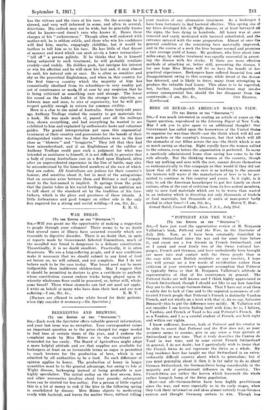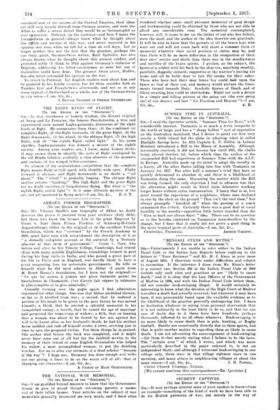"POTTERAT AND THE WAR."
[To atm EDITOR OF THR " SeEcTrroe."1 Sic,—I have just read the appreciative review of M. Benjamin Vallotton's book, Potterat and the ll•ar, in the Spectator of July 29th. Now, as I have been constantly domiciled in German Switzerland since the war and for some time before it, and count not a few friends in French Switzerland, and as I speak and read freely two of the Swiss national lan- guages, French and German, and have undoubtedly been brought far more into real contact with the Swiss people than is the case With most British residents or any tourists, I lisp, you will permit me a few words of rectification rather than criticism of your reviewer's apparent assumption that l'otterat is typically Swiss or that H. Benjamin Yallottoit's attitude •is representative of that of his countrymen in general. The Potterat books arc well known and I think highly appreciated in French Switzerland, though I should not like to say how familiar they are to the average German-Swiss. That I have not read them is solely due to lack of time and to the repeated ussurances of cul- tivated French people that Potterore.Frenell is distinctly Vaudois French, and not wholly on a level with that of, let us say, Sylvestre Bonnard—this to put the difference very mildly. M. Vallotton will not consider I am herein finding fault with him; he is. I believe, a Vaudois, and French of Vaud is his and Potterat's French. Hs as a Vaudois, and I as a careful student of French, are both right and within our rights.
I know sufficient, however, both of Potterat and his creator in be able to assert that Potterat and the War does not, as your reviewer seems to assume, give in any sense a trite picture of Switzerland in war time. That it truly describes the Canton de Vaud in war time, and to some extent French Switzerland in general, I do not doubt; but I particularly wish to insist that the French Swiss do not represent the Swiss as a whole. My long residence here has taught me that Switzerland is an extra- ordinarily difficult country about which to generalize; but if you must generalize about it then it is far safer to do so about German Switzerland, the German-Swiss heing considerably in the majority and of predominant influence in the country. The French-Swiss are rather the leaven which lenveneth the whole rather lumpish lump of the Swiss population.
Most—not all—German-Swiss hove been highly pro-German since the war, and were especially on in its early stages, when they took their information and ideas almost entirely from German sources and thought Germany certain to win. Though less
eonvinced now of the success of the Central Empires, their ideas are still very largely derived from German sources, and were the Allies to suffer a severe defeat they would be as Germanophil as ever to-morrow. Potterat, on the contrary—and here I mean the Fromh-Swiss in general—always knew what he thought about the raids and wrongs of this war, and never wavered in his opinion—not even when we fell for a time on evil days. Let us forget neither this nor the fact that the greatest, perhaps the one truly great, German-Swiss writer, Karl Spitteler, has also always known what he thought about this present conflict, and protested nobly (1 think in 1915) against Germany's violation of Belgium, addressing his fellow-countrymen as none but one of themselves could hare done. The greatest Swiss artist, Hodler, hoe also never concealed his opinion on the war.
To revert to Potterat. Let English readers read about him and lie grateful to his kindly creator, but let them consider both as Vaudois first and French-Swiss afterwards, and not as in any sense typical of Switzerland as a whole, nor of the German-Swiss in any sense--I um, Sir, fie., A BRITISH RESIDENT IN GERMAN SW ITURLAND.



































 Previous page
Previous page